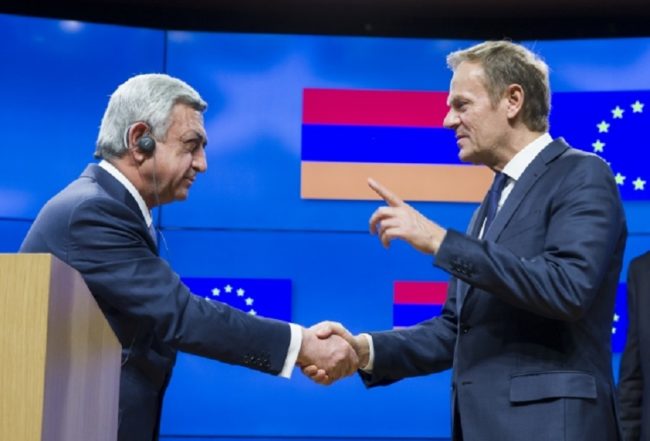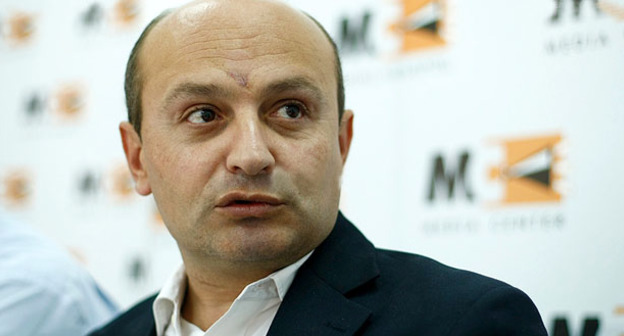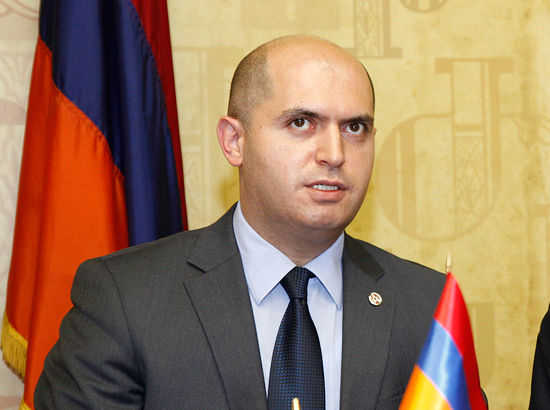

 A new EU–Armenia agreement has every chance of soon being signed. The controversy in Armenia surrounding the document boils down to whether it will be signed on 24 November at the Brussels summit of the Eastern Partnership, or if it will be postponed again — and for what reasons.
A new EU–Armenia agreement has every chance of soon being signed. The controversy in Armenia surrounding the document boils down to whether it will be signed on 24 November at the Brussels summit of the Eastern Partnership, or if it will be postponed again — and for what reasons.
[Read in Armenian — Հոդվածը հայերեն կարդացեք]
357 pages on justice, security, human rights and fundamental freedoms
According to statements from official negotiators in Yerevan, Armenia now plans to sign a new partnership agreement with the EU. The Agreement on Comprehensive and Enhanced Partnership was initialed on 21 March. It is the outcome of negotiations initiated by the EU Council of Ministers on 12 October 2015 in Luxembourg. If signed, Armenia will become the only state from the Russian-led Eurasian Economic Union and the Collective Security Treaty Organisation, a military alliance of six post Soviet states, participating in European Union integration projects.
Prospects for signing the predecessor to this agreement — the Armenia–EU Association Agreement (including a Deep and Comprehensive Free Trade Agreement) — were brought to naught on 3 September 2013, after Armenian President Serzh Sargsyan unexpectedly announced while on a trip to Moscow the country’s accession to the Eurasian Union.
In contrast to the texts of the Association Agreement, the Agreement on Comprehensive and Enhanced Partnership has already been made public. The emphasis in the extensive 357-page document is put on the affirmation of justice, freedom, and security in Armenia; reforming the Constitution and the judiciary; observance of human rights and fundamental freedoms. And all this provided that the European Union helps finance various projects in Armenia.
Expectations vs reality

The founder of the Armenian Institute of International Affairs and Security, Stepan Safaryan, told OC Media that the fact the text of the new agreement was made public theoretically excludes any speculation about its content.
According to him, after getting acquainted with the text, it will be extremely clear to anyone what Armenia can expect from the EU. Compared to the document regulating Armenia’s membership to the Eurasian Union, Safaryan notes the agreement does not promise much in terms of Armenia’s relations with the EU.
Safaryan noted the inflated expectations of the Armenian leadership from membership in the Eurasian Union, including a possibility of Nagorno-Karabakh joining the project. According to him, despite the ‘somewhat blurred’ wording of the EU agreement in comparison to the precise wording of the 2013 Association Agreement, it still provides ‘the opportunity for Armenia to talk with Europe in one language’.
Edmond Marukyan, an MP from the opposition parliamentary bloc Yelk, who strongly supports this initiative, told OC Media the signing of this agreement was a minimal step towards the EU. He considers Armenia’s withdrawal from the Eurasian Economic Union and signing the Association Agreement to be at the other end of the scale. Marukyan assesses the existing 1996 agreement between Yerevan and Brussels as hopelessly outdated, characterising the Agreement on Comprehensive and Enhanced Partnership as a real opportunity to update the agenda of relations with the EU.
In an interview with OC Media, ex-chairman of the Commission on Foreign Relations at the Armenian parliament Hovhannes Igityan claimed that apparent obstacles to the agreement were played upon by the authorities, so they could claim a ‘diplomatic victory’ when they finally sign it.
Yerevan’s refusal to sign the agreement, according to his estimates, would be another lost opportunity for Armenia’s ‘economic and civilisational’ development.
He is also convinced that in future, if both parties desire it, the agreement could be expanded upon. He says that the ‘imminent collapse’ of the Eurasian Union, which ‘stands on the will of one man [Russian President Vladimir Putin]’, will open up new opportunities for Armenia–EU relations.
Having their cake and eating it

There was no sharp opposition from Moscow to the new agreement, primarily because it’s seen as lightweight in comparison to the 2013 document. MP from the ruling Republican Party Mihran Hakobyan argues that the EU agreeing to drop economic components for this agreement shows that they have accepted Armenia’s policy of building ties with both Moscow and Brussels.
This sentiment is echoed by another MP from the Republican Party, chair of parliament’s Permanent Commission on Foreign Relations and the main negotiator with the EU, Armen Ashotyan. He considers opposition between the EU and the Eurasian Union harmful to Armenia. He sees the agreement with the EU as the result of combining these two integration projects.
As evidence of a softening position in the European Commission regarding the agreement with Armenia, Ashotyan recalled a previously harsher tone from the Commission ‘essentially pursuing the achievement of purely geopolitical goals aimed against Russia’.
Nagorno-Karabakh in the final declaration of the Brussels summit
A source in the Armenian government told OC Media that paragraph two of the final declaration of the forthcoming Eastern Partnership Summit in Brussels on 24 November will declare the participants’ support for the territorial integrity of the Eastern Partnership countries. This point has been especially pushed by Ukraine, Georgia, and Azerbaijan, with the latter having threatened to leave the Council of Europe.
The ex-director of Armenia’s National Security Service, Davit Shahnazaryan, told OC Media ‘two more [unnamed] EU countries are lobbying for the inclusion of Baku’s position in the declaration’.
The position of Yerevan is most clearly reflected by their main negotiator with the EU, Armen Ashotyan, who de facto led the signing of the Armenia–EU agreement in accordance with the principles of the OSCE Minsk Group, which promotes a peaceful resolution of the conflict over Nagorno-Karabakh: non-use of force, self-determination, and territorial integrity, both in the final Brussels Declaration and, in fact, in the text of the agreement itself.
The Metsamor nuclear power plant
There was a special surge of emotions among opponents of the agreement caused by a mention in the text of the need for a safe decommissioning of Armenia’s Metsamor nuclear power plant. The concern was caused by the automatic entry of the power plant into the jurisdiction of the European Atomic Energy Community once the agreement is signed.
However, on 1 November, describing supposed discussions on the closure of Metsamor as ‘artificial and having no relation to reality’, Armenian President Serzh Sargsyan has probably put an end to this issue.
‘In the draft agreement with the EU, the point of objective exploitation of Metsamor is formulated by default in full compliance with the International Atomic Energy Agency criteria. So the nuclear power plant will be operating at least until 2027. In the agreement with the EU there is no point that implies its closure after the signing,’ the president said.
Behind the curtains
The core essence of the agreement, and prospects for it being signed, are no longer raising many questions. But, questions and doubts still remain about the timing.
Uncertainty surrounding the agreement in Armenia, which may lead to its postponement, has been heavily debated. In particular, the debate has revolved around technical obstacles to translating the document into the 28 official languages of the EU. However, the European Commission was quick to state there was no such problem.
Nevertheless, there are still obstacles ahead for the Armenian delegation to Brussels. The president of the Yerevan Press Club, Boris Navasardyan, does not rule out that the signing will be postponed until the spring of 2018. He says this could happen to coincide with Armenia’s transition from a semi-presidential to parliamentary system of government.
This process will end in April 2018 with the termination of the powers of the incumbent President Serzh Sargsyan. Navasardyan argues that before they commit themselves, some EU countries are trying to figure out who they will be dealing with after April 2018 — a pro-Russian or a pro-Western prime minister.






